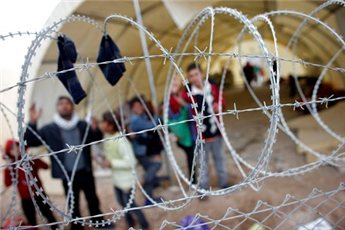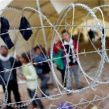
Chechen Leader Takes Up the Cause of Ethnic Kin in Syria
Publication: Eurasia Daily Monitor Volume: 10 Issue: 153
By:

On August 12, Chechen militants launched a bomb attack targeting the reconnaissance group of the Russian interior ministry’s Sever Battalion, which is primarily manned by residents of the Chechen Republic (www.mk.ru/incident/article/2013/08/13/898403-chechenskie-boeviki-vzorvali-chechenskiy-spetsnaz.html). One officer died and four others were injured in the blast. That same day, military exercises started in Chechnya. All three motorized rifle brigades stationed in the republic are participating in the exercises. They are the 8th Guards Separate Motorized Rifle Brigade, which is stationed in the foothills near the city of Shali, the 17th Guards Separate Motorized Rifle Brigade, which is stationed at the village of Borzoi in the mountainous part of the republic, and the 18th Guards Separate Motorized Rifle Brigade, which is stationed in the village of Kalinovskaya near the Terek River in the Chechen plains (https://ria.ru/defense_safety/20130812/955798047.html). The military exercises include marching to the area of concentration, preparing for repelling a simulated enemy attack, moving in unfamiliar terrain, disguising movements and organizing interaction between units (https://www.kavkaz-uzel.ru/articles/228536/).
However, news of the attack on the Sever Battalion and the military exercises was overshadowed by the civil war in Syria and its effect on Chechen society. After the Syrian civil war started, the issue of helping the North Caucasian diasporas in Syria that have resided there since the end of 19th century came to the fore. It has repeatedly been reported that these diasporas have been targeted by both Syrian opposition and government forces (https://www.kavkaz-uzel.ru/articles/215392/). For example, at the start of this year, the Chechen diaspora disseminated reports about the disastrous situation of Chechen refugees in Turkey’s Ceylanpinar refugee camp. The refugees, numbering up to 50 people, reported they had fled the Syrian province of Raqqa and were waiting anxiously in the town of Ceylanpinar on the border with Syria (https://www.kavkaz-uzel.ru/articles/218683/). Sources report that many more Chechens have fled Syria to Jordan rather than to Turkey. The reason for this is that the Chechen diaspora is well positioned in Jordan’s political and economic circles. This allows Syrian Chechens to find temporary refuge among the Jordanian Chechens, who live in a tightly knit ethnic community.
At the end of June, there were news reports that several dozen ethnic Chechens from Syria had arrived in Grozny at the invitation of Ramzan Kadyrov (https://leko007.livejournal.com/486675.html). The Chechen authorities announced that all of them would receive housing, food and employment. This was the first indication that the Chechen authorities would start asking the Russian government for concessions to help their ethnic brethren and repatriate as many of them as possible.
On August 13, Chechen TV broadcast a detailed report on a meeting between Kadyrov and the Chechen Republic’s representative in the Russian Federation Council, Ziyad Sabsabi, who is deputy chairman of the Federation Council’s Foreign Affairs Committee. A native of Syria himself (www.rg.ru/2008/11/26/reg-kuban/sabsabi-anons.html), Sabsabi is eagerly working on the issue. During the meeting Kadyrov and Sabsabi discussed issues involving Chechen refugees from Syria who have ended up in Jordan.
It turns out that the Chechen authorities are holding talks with the Jordanian government about transferring ethnic Chechens from Jordan to Chechnya, and a decision was made to provide large-scale assistance to all Chechen refugees who end up in Jordan. A Chechen humanitarian fund sends money for food, housing and other expenses to all Chechen refugees from Syria on a monthly basis. In order to deliver the aid, the Chechen fund has subcontracted a Jordanian humanitarian organization that is supposed to implement the project specifically for the benefit of Chechen refugees from Syria (www.grozny-inform.ru/main.mhtml?Part=8&PubID=44471). Having learned of the plight of the other Chechen refugees from Syria in refugee camps, Ramzan Kadyrov ordered that they also be sent humanitarian aid. It should be noted that none of the ethnic Chechens from Syria live in refugee camps in Jordan; rather they rent private housing in Amman and Zarqa. According to Sabsabi, the Chechen authorities have assumed responsibility for all needs of the refugees, including funds for the education of refugee children. Apart from that, a new international air link was announced in Chechnya, connecting Amman and Grozny. The weekly flight is set to begin operating this fall. An estimated 500 ethnic Chechen refugees from Syria are waiting for a decision by the Russian authorities to allow them to immigrate to Russia (www.kavkaz-uzel.ru/articles/210970/)
Chechen state TV continued the Syrian theme with an unexpected story about a young Chechen’s return home. Kadyrov’s press service supplied the TV channel with a story about Muslim Magomadov from the village of Berdykel, who told Kadyrov that he had been deceived about the war in Syria and, against the wishes of his relatives, had left Chechnya in secret and arrived in Syria. The young man spent three months there, which was enough for him to ask to be returned home (https://aligrozny.livejournal.com/235503.html). The TV piece was certainly a piece of propaganda aimed at dissuading Chechens from joining the forces opposed to the Bashar al-Assad regime. In addition, the TV story aimed to show off the omnipotence of the Chechen authorities, showing they could locate and evacuate a Chechen from the rebels in Syria. In any case, Muslim Magomadov will now have to explain to the authorities where he was in Syria, and with whom, unless the story was simply made up.
In all these instances linked to Syria, Ramzan Kadyrov was demonstrating his intense interest in the issue and his ability to influence it. The Russian foreign ministry did not seem to play an important role as Kadyrov appeared to be bypassing Russian officials. This suggests that Kadyrov may still enjoy a special relationship with President Vladimir Putin, which allows him to resolve the question of repatriating ethnic Chechens from Syria to their historical homeland and supporting Chechen refugees from Syria in Jordan and Turkey.




